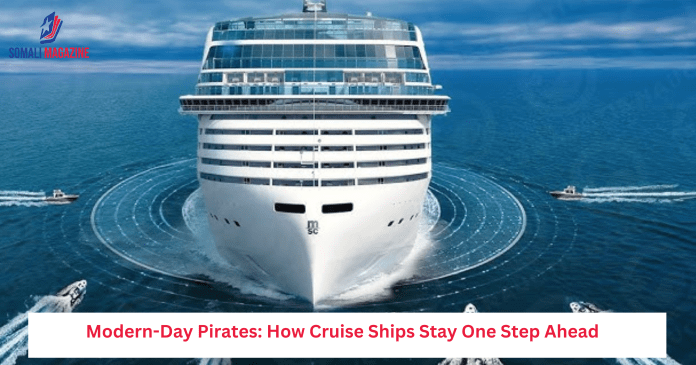Facebook Twitter (X) Instagram Somali Magazine - People's Magazine
Though rare, pirate attacks on cruise ships still happen — but advanced security, trained crews, and smart tactics keep passengers safe
Pirates attacking ships might sound like something from an old movie, but it’s still a real concern in some parts of the world today. Recently, passengers on the cruise ship Queen Anne were told to keep their cabin lights off and stay away from the outside decks while passing through a risky area near the Philippines. The warning was shared in a video on TikTok, and it mentioned that this region is known for piracy threats, so the ship was on high alert.
Yes, but it’s very rare. Since 2005, only six attacks on cruise ships have been reported: In 2005, Seabourn Spirit was fired at near Somalia. In 2008, Le Ponant was hijacked in the same region, though it was only carrying crew members. That same year, Nautica was shot at in the Gulf of Aden. In 2009, MSC Melody was attacked, and passengers helped fight off pirates. In 2011, Spirit of Adventure faced a threat off the coast of Tanzania. In 2012, Azamara Journey was approached near Oman.
The Le Ponant incident was the only time pirates successfully hijacked a cruise ship. The crew was held hostage and later released after a ransom of £2 million was paid. Later, French forces captured and arrested the pirates, who were put on trial in Paris.
Attacks at sea are more common on merchant and cargo ships than cruise ships. According to the International Maritime Bureau (IMB), there were 116 piracy incidents around the world in 2024. Most of these happened near Somalia, Indonesia, and the Singapore Straits. No cruise ships were involved.
In total, 94 ships were boarded, 13 were attacked unsuccessfully, six were hijacked, and three were shot at. The number of crew taken hostage jumped from 73 in 2023 to 126 in 2024. Guns were used in 26 of the incidents.
The IMB, based in London, keeps track of global piracy and helps warn ships about possible dangers. It was founded in 1981 to fight fraud at sea but now also deals with ship robberies and piracy in both international waters and territorial seas. It can also broadcast real-time alerts to ships during active threats.
When pirates do approach, cruise ships follow strict emergency plans. In 2008, when pirates closed in on Nautica in the Gulf of Aden, the captain ordered the ship to zig-zag to create waves and destabilize the pirate boats. Security teams, often made up of former military members, were on watch and ready with water cannons and sound-based defense systems.
In another incident in 2009, MSC Melody was attacked during the night near Somalia. The cruise director warned everyone to stay in their cabins and keep lights off. Pirates with AK-47 rifles tried to board the ship. Security fired warning shots and flares, and even some passengers joined in by throwing furniture at the attackers. A Spanish navy ship arrived later to escort the cruise to safety.
Even though pirate attacks on cruise ships are extremely rare, cruise lines remain cautious. Experts say cruise ships are more difficult to board than cargo ships due to their height, design, number of people, and onboard security. Pirates would have to climb several decks to reach the bridge, which is nearly impossible while the ship is moving.
Some cruise lines take additional steps when passing through risk zones. In 2014, for example, a cruise ship near Somalia brought onboard armed guards and installed barbed wire along the railings. Crew and passengers practiced safety drills and were shown where to hide in case of an attack.
The Cruise Lines International Association (CLIA) says cruise companies take safety very seriously. They monitor their routes carefully and can change course if necessary. A Cunard spokesperson said the warning on Queen Anne was just a precaution and that passengers were never in danger.
In the end, while piracy still happens, the risk to modern cruise ships is low—and they’re very well-prepared just in case.

